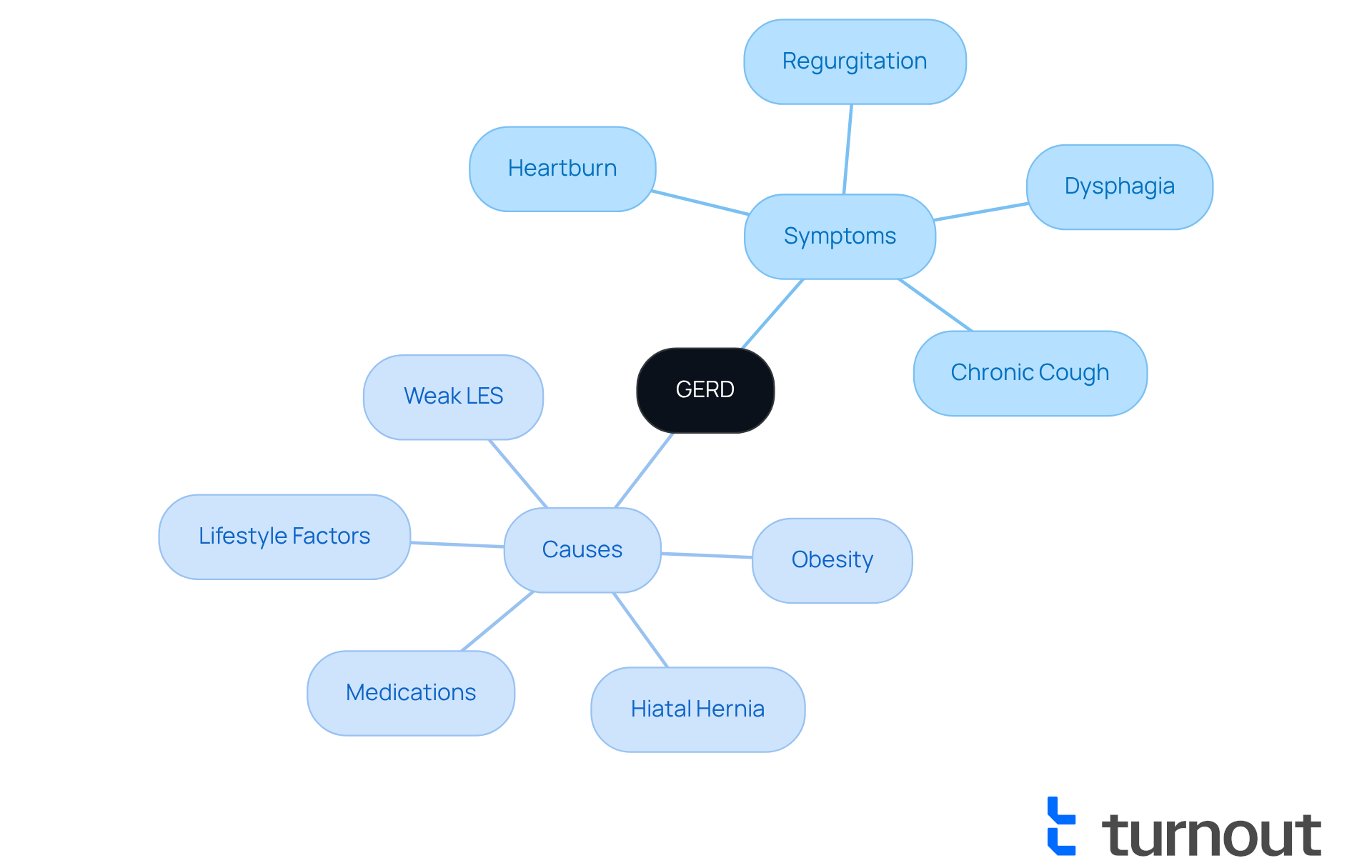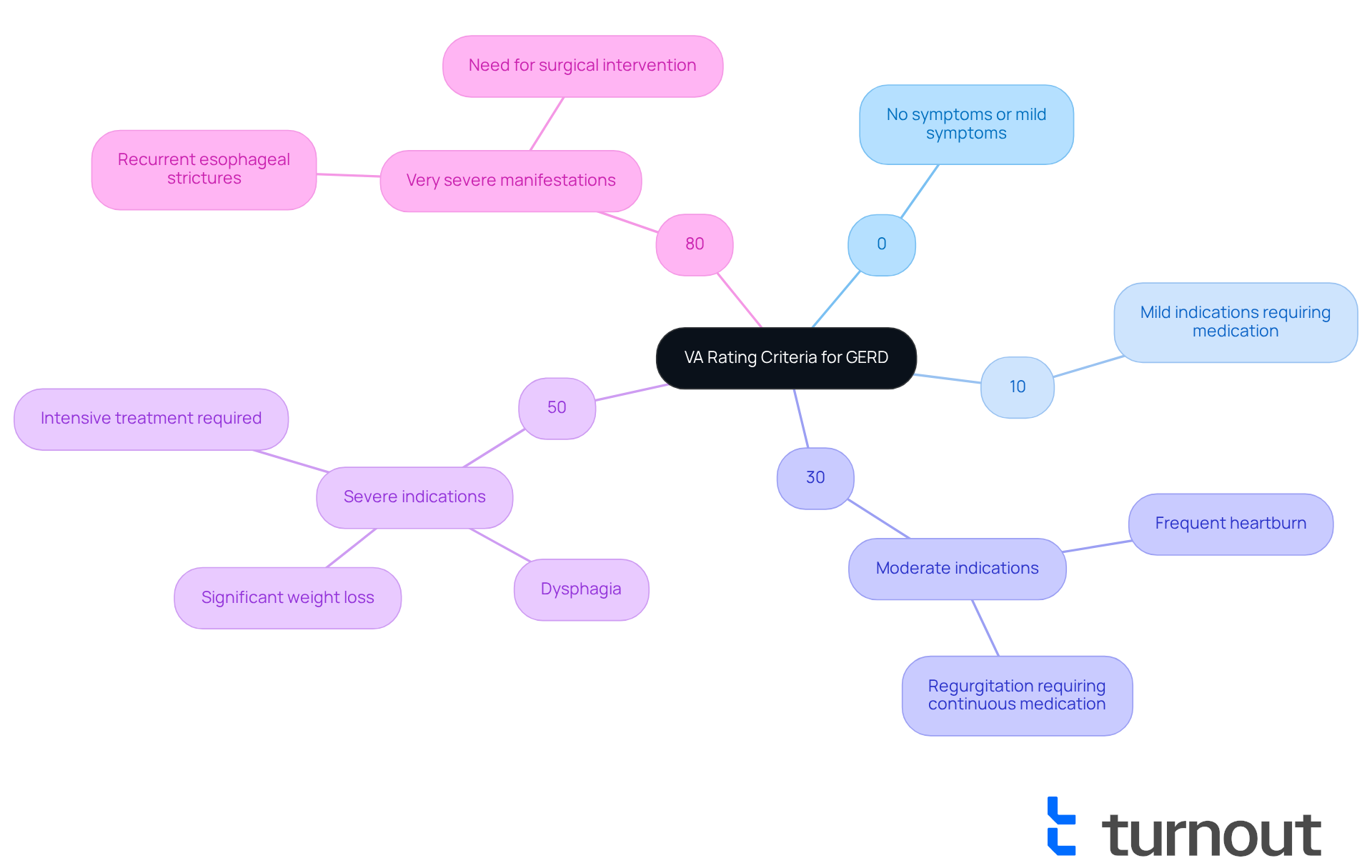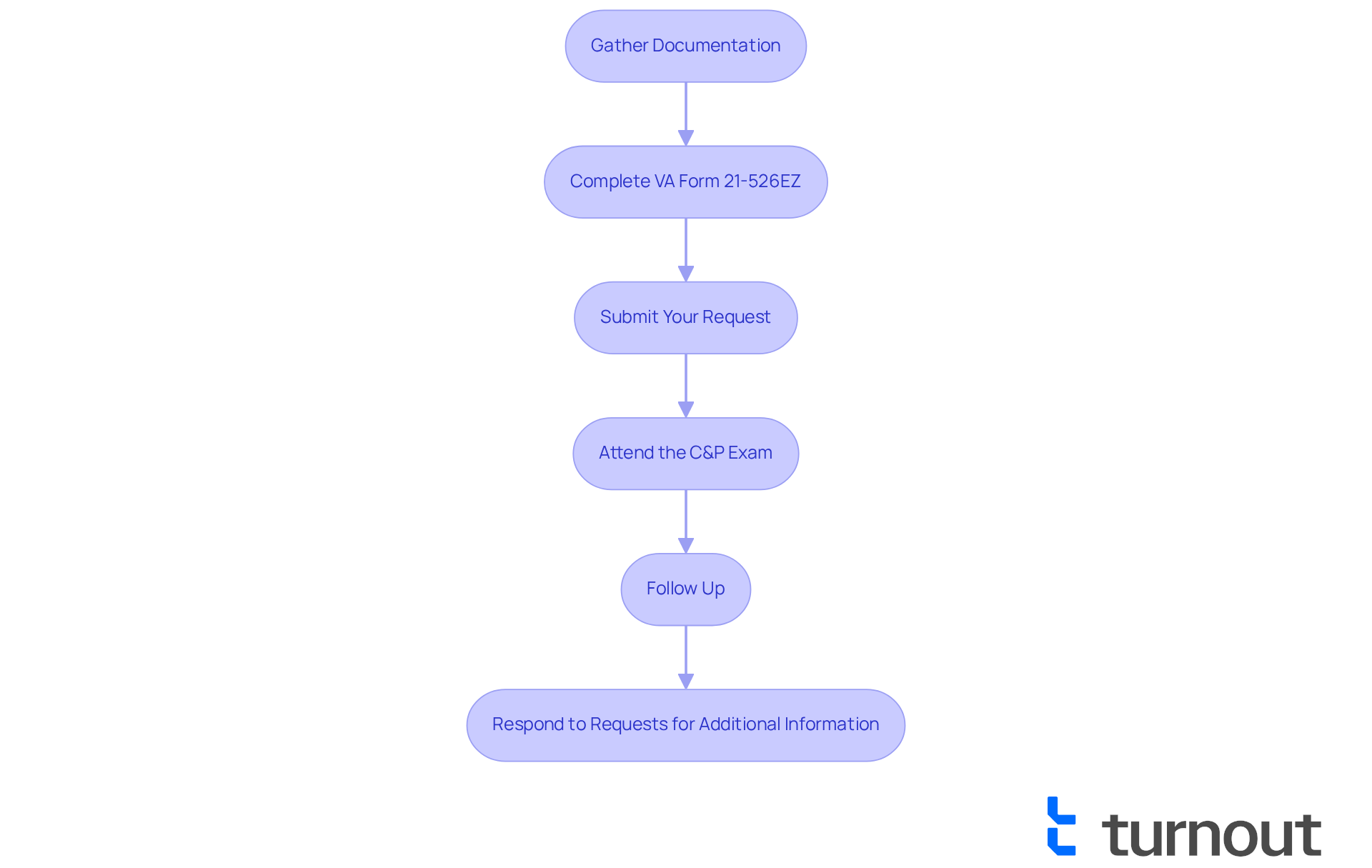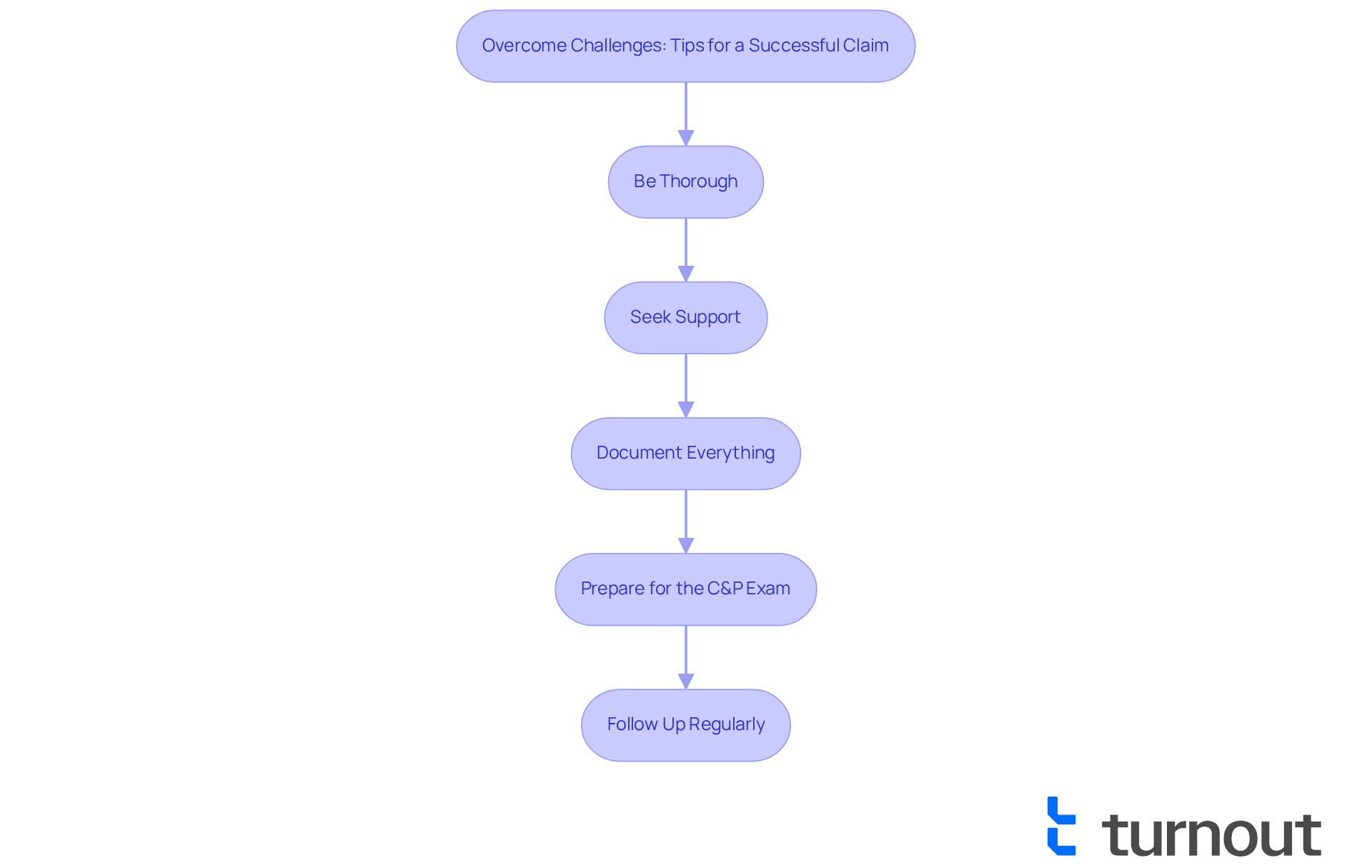Overview
Navigating the VA GERD rating claim process can feel overwhelming, and we understand that. This article aims to guide you through each step with compassion and clarity. Here, we provide a comprehensive, step-by-step guide on how to file your claim effectively.
First and foremost, thorough documentation is essential. It’s important to gather all necessary information to support your claim. Understanding the rating criteria is equally vital; knowing what to expect can help alleviate some of the stress you may feel.
Additionally, preparing for the Compensation and Pension exam is a crucial part of this process. This preparation enhances your chances of a successful outcome in obtaining the VA benefits you deserve for gastroesophageal reflux disease.
Remember, you are not alone in this journey. We’re here to help you every step of the way. By following these guidelines, you can approach your claim with confidence and hope for a positive resolution.
Introduction
Gastroesophageal reflux disease (GERD) is more than just an occasional heartburn; it’s a chronic condition that can significantly disrupt daily life. For veterans, navigating the complexities of VA ratings can add to this challenge. We understand that recognizing the symptoms and causes of GERD is crucial, as it directly influences the VA's assessment of claims related to this condition.
With recent updates to the VA rating criteria, many veterans may find themselves grappling with new challenges in securing the benefits they deserve. It's common to feel overwhelmed by these changes. How can veterans effectively master the VA GERD rating process and ensure their claims are accurately represented? We're here to help you through this journey, providing the guidance and support you need.
Understand GERD: Symptoms and Causes
Gastroesophageal reflux disease (GERD) is a long-term condition that can significantly impact your comfort. It is characterized by the reverse movement of stomach acid into the esophagus, leading to a variety of uncomfortable manifestations. We understand that dealing with GERD can be challenging, and recognizing its symptoms is the first step toward relief. Key symptoms include:
- Heartburn: A burning sensation in the chest, often exacerbated after meals or when lying down.
- Regurgitation: The uncomfortable feeling of acid rising into the throat or mouth.
- Dysphagia: Difficulty swallowing, which may arise from inflammation of the esophagus.
- Chronic cough: A persistent cough that can worsen during the night.
The causes of GERD are multifaceted and can include several factors that may resonate with your experiences. These include:
- Weakness of the lower esophageal sphincter (LES), which normally prevents acid reflux.
- Obesity or being overweight, which increases abdominal pressure.
- Hiatal hernia, a condition where part of the stomach pushes through the diaphragm.
- Certain medications that may relax the LES, contributing to reflux.
- Lifestyle factors such as smoking, dietary choices, and alcohol consumption.
Grasping these indicators and origins is essential, particularly for former service members in relation to the VA GERD rating. It allows you to express your experiences clearly when submitting requests for the VA GERD rating associated with acid reflux. Recent data shows that roughly 20% of the U.S. population suffers from digestive issues weekly. This highlights the commonality of this condition among veterans, reminding you that you are not alone in this journey.
Moreover, complications from unmanaged gastroesophageal reflux disease can include Barrett’s esophagus, esophageal stricture, and esophageal adenocarcinoma. This underscores the importance of timely diagnosis and treatment. Lifestyle solutions, such as steering clear of food and drinks two to three hours prior to sleep, can assist in effectively managing issues, as recommended by Dr. Womble.
Furthermore, the recent FDA approval of vonoprazan (Voquezna) as a treatment option for gastroesophageal reflux disease offers veterans new avenues for relief. Staying informed about available therapies is essential, and we’re here to help you navigate this path toward better health.

Review the VA Rating Criteria for GERD
The VA gerd rating for gastroesophageal reflux disease is assessed under Diagnostic Code 7206, with ratings ranging from 0% to 80% based on the severity of symptoms and their impact on daily life. As of May 19, 2024, the VA has updated its criteria for the va gerd rating, placing greater emphasis on the need for documented history of esophageal strictures and dysphagia to qualify for a compensable rating. Below is a detailed breakdown of the rating criteria:
- 0%: No symptoms or mild symptoms that do not require treatment.
- 10%: Mild indications that necessitate medication but do not significantly hinder daily activities.
- 30%: Moderate indications, such as frequent heartburn and regurgitation, requiring continuous medication.
- 50%: Severe indications, including dysphagia and significant weight loss, requiring more intensive treatment.
- 80%: Very severe manifestations, characterized by recurrent esophageal strictures or the need for surgical intervention.
We understand that navigating these complexities can be overwhelming. Veterans should know that acid reflux can also be assessed as secondary to conditions like PTSD, which may strengthen their claims. To bolster their requests, veterans are encouraged to compile comprehensive medical documentation that accurately reflects their symptoms and treatment history. This evidence is crucial for illustrating how the condition affects their quality of life and for obtaining a suitable va gerd rating.
The VA recognizes that gastroesophageal reflux disease can lead to significant quality-of-life challenges, often more pronounced than other ailments. This highlights the importance of thorough documentation and possibly securing a nexus letter to establish a service connection. Remember, you are not alone in this journey; we’re here to help you through the process.

File Your VA Claim: Step-by-Step Process
Filing a VA claim for a VA GERD rating can feel overwhelming, but we're here to guide you through it. Here are several key steps to help you along the way:
-
Gather Documentation: Start by collecting all relevant medical records. This includes diagnosis reports, treatment history, and any correspondence with your healthcare providers. Having everything organized can ease the process.
-
Complete VA Form 21-526EZ: This form is essential for applying for disability compensation. Make sure every section is filled out accurately to avoid any delays. We understand that this can be a daunting task, but taking your time here is crucial.
-
Submit Your Request: You can file your request online through the VA website, by mail, or in person at your local VA office. Remember, the average processing duration for VA requests is about 100.4 days, so prompt submission is essential. You might also consider submitting an intent to file form to secure an earlier effective date for compensation.
-
Attend the C&P Exam: After submitting your request, you may need to attend a Compensation and Pension (C&P) exam. This is where a VA examiner will assess your condition. It’s common to feel anxious about this step, but it’s an important part of the process.
-
Follow Up: Stay informed by monitoring your status through the VA’s online portal or by reaching out directly to the VA. We understand that waiting can be stressful, but staying proactive can help you respond quickly to any requests.
-
Respond to Requests for Additional Information: Be prepared to provide any additional documentation or information the VA may request during their review. Remember, you have up to a year from the submission date of your request to provide this evidence, which can significantly influence your application.
Practical instances show that veterans who carefully follow these steps often experience smoother application processes. By ensuring that your documentation is complete and precise, you can enhance your VA GERD rating and increase your chances of a positive outcome. As specialists in service organizations for veterans emphasize, careful planning and prompt responses are vital for successfully navigating the application process. You're not alone in this journey; we're here to help every step of the way.

Overcome Challenges: Tips for a Successful Claim
Navigating the VA benefits process can be challenging, especially for veterans seeking assistance with their VA GERD rating. We understand that this journey can feel overwhelming, but there are essential strategies that can enhance your chances of a successful claim.
- Be Thorough: It's important to ensure that all medical records and documentation are complete and current. Incomplete information can lead to delays in processing your request. Remember, approximately 80% of former service members may be underestimated by the VA, highlighting the critical need for comprehensive documentation.
- Seek Support: Partnering with a veterans service organization or a qualified expert can provide valuable guidance and assistance throughout the application process. Consulting services like Veterans Guardian can help you prepare your applications efficiently.
- Document Everything: Keeping detailed records of all communications with the VA is crucial. Make note of dates, times, and the names of representatives you interact with. This documentation can be invaluable if any issues arise.
- Prepare for the C&P Exam: During the Compensation and Pension exam, it’s important to be honest and specific about your symptoms. Share specific instances that illustrate how GERD affects your daily life, as this can significantly impact the outcome of your case.
- Follow Up Regularly: Staying proactive by checking the status of your request and responding promptly to any inquiries from the VA is essential. Regular follow-ups can help keep your request moving forward.
By implementing these strategies, veterans can improve their chances of receiving the benefits they deserve for their VA GERD rating. Recent improvements in VA processing times and management of requests indicate that the system is becoming more efficient and accessible. Remember, thorough documentation and proactive communication are key to overcoming the challenges of the VA claims process. You are not alone in this journey; we're here to help.

Conclusion
Mastering the VA GERD rating process is essential for veterans who deserve the benefits they seek. We understand that navigating gastroesophageal reflux disease (GERD) can be challenging. By familiarizing yourself with its symptoms and the VA's rating criteria, you can approach your claims with greater confidence. Recognizing the complexities of GERD and the importance of thorough documentation empowers you to advocate for your health and well-being.
Key insights from this article highlight the importance of:
- Gathering comprehensive medical records
- Understanding the specific VA rating criteria
- Preparing adequately for the Compensation and Pension exam
It's common to feel overwhelmed, but being proactive and thorough throughout the claim process can significantly influence the outcome of your VA GERD rating. Seeking support from veterans service organizations can also provide valuable assistance on this challenging journey.
Ultimately, securing a favorable VA GERD rating is within your reach through careful planning, diligent documentation, and proactive communication. We encourage you to take charge of your claims by utilizing the strategies outlined in this guide. By doing so, you not only enhance your chances of receiving the benefits you deserve but also contribute to a broader understanding of the challenges faced by many veterans dealing with GERD. Remember, you are not alone in this journey; we are here to help.
Frequently Asked Questions
What is GERD?
Gastroesophageal reflux disease (GERD) is a long-term condition characterized by the reverse movement of stomach acid into the esophagus, leading to various uncomfortable symptoms.
What are the key symptoms of GERD?
Key symptoms of GERD include heartburn (a burning sensation in the chest), regurgitation (acid rising into the throat or mouth), dysphagia (difficulty swallowing), and a chronic cough that may worsen at night.
What are the causes of GERD?
Causes of GERD include weakness of the lower esophageal sphincter (LES), obesity or being overweight, hiatal hernia, certain medications that relax the LES, and lifestyle factors such as smoking, dietary choices, and alcohol consumption.
Why is it important to understand GERD symptoms and causes?
Understanding GERD symptoms and causes is essential for effectively managing the condition and for veterans to clearly express their experiences when submitting requests for the VA GERD rating associated with acid reflux.
How common is GERD among the population?
Recent data shows that roughly 20% of the U.S. population suffers from digestive issues weekly, highlighting the commonality of GERD among veterans and others.
What complications can arise from unmanaged GERD?
Complications from unmanaged GERD can include Barrett’s esophagus, esophageal stricture, and esophageal adenocarcinoma, emphasizing the importance of timely diagnosis and treatment.
What lifestyle changes can help manage GERD?
Lifestyle solutions for managing GERD include avoiding food and drinks two to three hours prior to sleep.
What recent treatment option has been approved for GERD?
The recent FDA approval of vonoprazan (Voquezna) offers a new treatment option for gastroesophageal reflux disease, providing veterans with additional avenues for relief.




